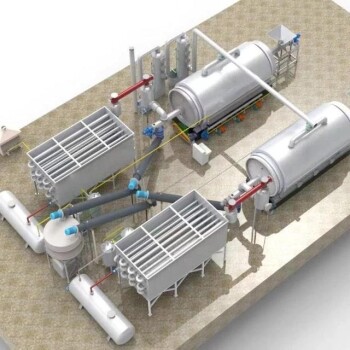Tyre pyrolysis is a process that converts waste tyres into valuable raw materials such as carbon black, steel, oil, and gas, which can be reused in various industrial applications. This process is considered environmentally friendly as it recycles 100% of the tyres and does not produce harmful pollution. Additionally, it helps reduce greenhouse gas emissions by offsetting CO2 and preventing the release of methane from waste decomposition. The use of advanced pyrolysis equipment further enhances sustainability by minimizing exhaust gas emissions and improving energy efficiency. Overall, tyre pyrolysis contributes to a circular economy and aligns with environmental protection standards, making it a sustainable solution for waste tyre management.
Key Points Explained:
-
Environmental Benefits of Tyre Pyrolysis:
- No Harmful Pollution: The tyre pyrolysis process is designed to be environmentally friendly, ensuring no harmful pollutants are released during the process. This aligns with strict environmental protection standards, such as those in European countries.
- Sealed Systems: Modern pyrolysis plants feature sealed feeding and slag discharge systems, which prevent air pollution and ensure compliance with environmental regulations.
-
Resource Recovery and Recycling:
- 100% Recycling: The pyrolysis process recycles 100% of waste tyres, extracting valuable materials like carbon black, steel, pyrolysis oil, and gas. These materials can be reused in various industrial applications, reducing the need for virgin resources.
- Energy Generation: The extracted pyrolysis oil and gas can be used to generate electrical energy, heat, steam, or hydrogen, contributing to energy sustainability.
-
Reduction of Greenhouse Gas Emissions:
- CO2 Offset: Pyrolysis helps offset up to 4 tonnes of CO2 equivalent per tonne of waste processed, significantly reducing the carbon footprint.
- Prevention of Methane Release: By processing waste tyres, pyrolysis prevents the release of methane (CH4), a potent greenhouse gas, which would otherwise be emitted during natural decomposition.
-
Economic and Environmental Efficiency:
- Combustible Gas Utilization: Advanced pyrolysis equipment uses combustible gas as fuel to supply heat to the pyrolysis furnace, reducing exhaust gas emissions and improving both economic and environmental benefits.
- Waste-to-Value Transformation: Pyrolysis transforms non-recyclable waste into value-added products like biochar, pyrolysis oil, and gas, which can be used in various applications, further enhancing sustainability.
-
Contribution to a Circular Economy:
- Bio-Based Economy: Pyrolysis supports a bio-based economy by converting raw and residual materials into useful products, reducing reliance on fossil fuels and promoting resource efficiency.
- Complementary Technology: Pyrolysis can be integrated with other processes, such as anaerobic digestion and plastic recycling, to enhance overall waste management and environmental protection.
-
Compliance with Environmental Standards:
- European Standards: The design and operation of pyrolysis plants meet the stringent environmental protection standards of European countries, ensuring sustainable and responsible waste management practices.
In conclusion, tyre pyrolysis is a sustainable solution for managing waste tyres, offering significant environmental, economic, and resource recovery benefits. By preventing pollution, reducing greenhouse gas emissions, and transforming waste into valuable products, tyre pyrolysis aligns with global sustainability goals and contributes to a circular economy.
Summary Table:
| Key Benefits of Tyre Pyrolysis | Details |
|---|---|
| Environmental Benefits | - No harmful pollution, sealed systems for compliance with EU standards. |
| Resource Recovery | - 100% recycling of tyres into carbon black, steel, oil, and gas. |
| Greenhouse Gas Reduction | - Offsets CO2 emissions, prevents methane release from waste decomposition. |
| Economic Efficiency | - Combustible gas utilization reduces emissions and improves energy efficiency. |
| Circular Economy Contribution | - Supports bio-based economy and integrates with other waste management processes. |
| Compliance | - Meets stringent European environmental standards. |
Learn how tyre pyrolysis can transform waste into value—contact us today for expert guidance!









